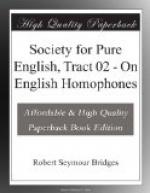An objector who should plead that homophones are not a nuisance might allege the longevity of the Chinese language, composed, I believe, chiefly of homophones distinguished from each other by an accentuation which must be delicate difficult and precarious. I remember that Max Mueller [1864] instanced a fictitious sentence
ba ba ba ba,
’which (he wrote) is said to mean if properly accented The three ladies gave a box on the ear to the favourite of the princess.’ This suggests that the bleating of sheep may have a richer significance than we are accustomed to suppose; and it may perhaps illustrate the origin as well as the decay of human speech. The only question that it raises for us is the possibility of distinguishing our own homophones by accentuation or by slight differentiation of vowels; and this may prove to be in some cases the practical solution, but it is not now the point in discussion, for no one will deny that such delicate distinctions are both inconvenient and dangerous, and should only be adopted if forced upon us. I shall assume that common sense and universal experience exonerate me from wasting words on the proof that homophones are mischievous, and I will give my one example in a note[8]; but it is a fit place for some general remarks.
[Footnote 8: The homophones sun = son. There is a Greek epigram on Homer, wherein, among other fine things, he is styled,
[Greek: Ellanon biotae deuteron aelion]
which Mackail translates ‘a second sun on the life of Greece’. But second son in English means the second male child of its parents. It is plain that the Greek is untranslatable into English because of the homophone. The thing cannot be said.
Donne would take this bull by the horns, pretending or thinking that genuine feeling can be worthily carried in a pun. So that in his impassioned ‘hymn to God the Father’, deploring his own sinfulness, his climax is
But swear by thyself that at my death
Thy Sonne
Shall shine as he shines now,
the only poetic force of which seems to lie in a covert plea of pitiable imbecility.
Dr. Henry Bradley in 1913 informed the International Historical Congress that the word son had ceased to be vernacular in the dialects of many parts of England. ’I would not venture to assert (he adds) that the identity of sound with sun is the only cause that has led to the widespread disuse of son in dialect speech, but I think it has certainly contributed to the result.’]
The objections to homophones are of two kinds, either scientific and utilitarian, or aesthetic. The utilitarian objections are manifest, and since confusion of words is not confined to homophones, the practical inconvenience that is sometimes occasioned by slight similarities may properly be alleged to illustrate and enforce the argument. I will give only one example.




